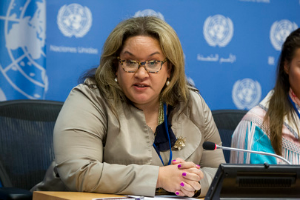 Statement by the Chair of the UN Permanent Forum on Indigenous Issues, Professor Megan Davis
Statement by the Chair of the UN Permanent Forum on Indigenous Issues, Professor Megan Davis
Today marks the eighth anniversary of the adoption of the UN Declaration on the Rights of Indigenous Peoples by the UN General Assembly on 13 September 2007.
The history of the Declaration is remarkable. It is the first international instrument on Indigenous Peoples that has counted on the involvement and leadership by the rights-holders themselves, the Indigenous Peoples. This marked the beginning of a new partnership between Indigenous Peoples and Member States, who worked side by side to draft and negotiate the text of the instrument. Each and every article of this Declaration is a response to the many passionate and substantive interventions of representatives of Indigenous Peoples’ organizations, nations and institutions from around the world. I know this because I had the privilege of participating at some of these historical meetings.
The Declaration embodies global consensus on rights that many of our people and ancestors fought long and hard for. It clearly sets out the individual and collective rights of Indigenous Peoples, including amongst others the rights to self-determination, traditional lands, education, culture, health, and to pursue a distinct vision of economic and social development. The Declaration emphasizes the rights of Indigenous Peoples to participate in matters that impact their lives, including in relation to their traditional lands, territories and resources.
Last year, in September 2014, the UN convened the World Conference on Indigenous Peoples. The outcome document lays out concrete steps to make the Declaration more operational.
We have had some progress. Yet, obstacles remain. There is reluctance by some governments to recognize Indigenous Peoples and redress historical wrongs, and many Indigenous Peoples are still marginalized and cannot exercise and enjoy their basic rights, in particular Indigenous women. There is a need for concerted action to overcome these obstacles. Member States need to demonstrate political will, technical capacity and financial commitment to implement the UN Declaration as the minimum standards for the survival, dignity and well-being of the Indigenous Peoples of the world.
This year the world is about to adopt a new development agenda for 2030 and is also discussing ways forward to address climate change. In these two processes, we must ensure that the provisions of the UN Declaration are taken into consideration so that Indigenous Peoples are not left behind.
On this anniversary, let us reaffirm the importance of the UN Declaration on the Rights of Indigenous Peoples, and continue our efforts for its full implementation.
 Welcome to the United Nations
Welcome to the United Nations


